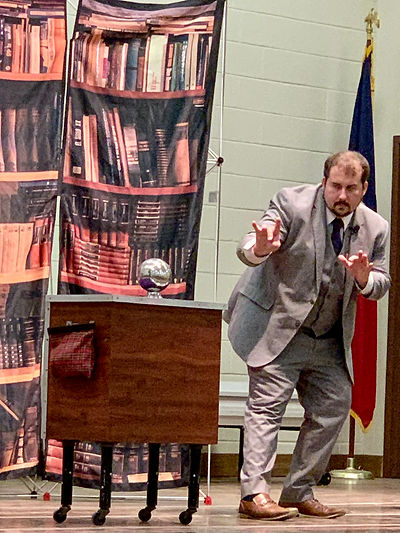


More Than A Magic Show
In 2008 magician Bronson Chadwick created a novel educational magic show called “The Magic of Reading.” That concept continued to grow steadily until after the 2020 pandemic when it was reborn not as a project or product of Chadwick but has his primary focus and mission. The Magic in the Library Initiative is more than a magic show for kids, but a nonstop resource for kids, parents, librarians, and educators both in and out of the classroom.
Bronson is constantly working on new ideas for his live “magic show” programs and believes firmly in the educational concepts first and the “magicality” second. The very purpose of his live programs and his complimentary resources online for students and educators is to inspire a sense of academic curiosity and illustrate key points of language arts skills.
Press
Our Mission
Our mission is to use the art of magic tricks to engage and inspire students, helping them to think critically and independently. We aim to cultivate a lifelong attitude of learning and curiosity, both in public and academic libraries. Through our programs, we encourage students to apply themselves in school, value old-fashioned paper books, and learn key concepts of language arts skills. We also teach how to use technology correctly for research purposes without relying on it as a crutch.
By assisting educators in illustrating concepts in new ways, we create a sense of camaraderie among students of varying academic skills, encouraging mutual support and resisting academic hazing and peer pressure. Our goal is to reach out to students who may have written themselves off from the academic world, helping them to see their value and potential.

Our Goals
One
To present the school version of the Magic in the Library Live program in two hundred schools each year.
Two
To present the library version of the Magic in the Library Live program in sixty public libraries in May through August of every year.
Three
To create resources for educators and students such as our live speaking events, video series, fascinating worksheets, blog articles and more.
Four
To author a series of children’s books themed around the world of magic including both works of fiction and “how-to” books on magic tricks.
About Bronson Chadwick
Bronson Chadwick is a full-time professional magician based out of sunny west Texas. Bronson is a second-generation magician originally hailing from Fort Worth, Texas with much of his childhood spent in the foothills of small-town North Carolina. Bronson's dad is a professional magician based out of Fort Worth who taught most of what Bronson knows about magic. Bronson has served as president of the Texas Association of Magicians, regional vice president of the Society of American Magicians, and has operated two magic shops.
When not doing magic, Bronson enjoys creative writing, art, film, music, theater, cooking, and warding off awkward situations with dry humor. You can learn more about Bronson Chadwick, including his work in magic outside of the Magic in the Library project, at his website at www.bronsonchadwick.com

Curriculum
The topics Bronson teaches is based largely on this curriculum. Note that the live show programs differ based on the audience and venue. For example, a program in a public library will be more about cultivating a love of books whereas a show program for a group of fifth graders may be more about reading comprehension, test taking skills, writing skills, etc. There are also advanced topics for varying levels of academic venues. For instance, in the college and high school versions of the program, some schools request Bronson speak on topics such as media literacy, research skills, academic integrity, and more. The below list are the foundational topics for a typical program for various grades.
Fiction v. Nonfiction
We explain the basics of fiction and nonfiction in every magic show program and help students understand that both categories have their role in literature and society.
Literary Genres and Subgenres
After illustrating fiction and nonfiction, various major genres are listed off. These major genres include such things as reference books, fantasy fiction, realistic fiction, biographies, sciences, history, and so-on. After some major genres are listed, subgenres are also explained. These compound subgenres include such topics as crossing fantasy fiction with horror fiction to create fantasy horror fiction.
Literary Mediums
Students are challenged to help think of other written works besides books including newspapers, various digital formats, magazines and other periodicals, letters, reports, essays, and more.
Reading Comprehension
Depending on the age range and needs of the group, Magic in the Library illustrates reading comprehension skills. The program uses techniques such as PQR3 (preview, question, read, recite, review) or alternatively Stop and Think, Slow Down and Read, Go Back and Review.
Cultivating a Love of Reading
Students are challenged to think about reading differently by exploring books that appeal to the individual.
Using Written Works for Research
Students are given a hypothetical problem during the program that must be solved by using valid sources of information found in books.
Writing Skills
Students are shown how to write a simple passage, such as a one-page paper, by using a brainstorming process and a writing plan.
Test Taking Skills and Mastering a Standardized Test
Students are shown useful techniques for overcoming anxiety on government-mandated standardized tests and given a few practical steps on how to overcome common problems.

